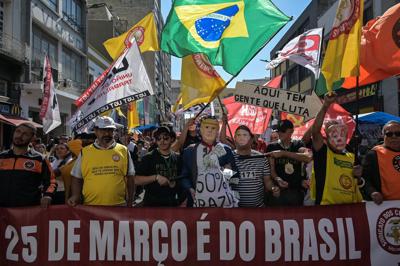U.S. President Donald Trump appears to be signing trade deals left and right. Canada is scheduled to agree to one by Aug. 1.
Except that Trump, contrary to his bluster, isnŌĆÖt negotiating genuine trade deals.
He is collecting protection money.
To paraphrase the gangster films: ŌĆ£Nice economy you got there. Shame if anything happened to it.ŌĆØ
In coming days, Prime Minister Mark Carney will report that the U.S. tariff on Canadian goods will not be the 35 per cent that Trump has threatened.
It will be lower than that. But the new rate will be much higher than the average 2.5 per cent U.S. tariff on imports before Trump took office.
Remember that number: 2.5 per cent. Anything higher than that is a Trump shakedown.
For decades, the worldŌĆÖs advanced economies have been lowering their tariff rates to create mutual prosperity with a free flow of goods unhindered by high tariffs.
WeŌĆÖve tried high tariffs, a ŌĆ£beggar thy neighbourŌĆØ approach. That deepened the Great Depression, one of the causes of the Second World War.
They apparently didnŌĆÖt teach that at the Wharton business school when Trump was a student there.
This week, Japan agreed to a 15 per cent tariff on its U.S. exports, lower than the 25 per cent tariff Trump threatened to impose. But itŌĆÖs much higher than the pre-Trump 2.5 per cent.
The Japanese have also agreed to invest a staggering $550 billion (U.S.) in the United States ŌĆ£at my direction,ŌĆØ Trump posted to social media.
Britain has agreed to a 10 per cent tariff on its U.S. exports, a fourfold increase from the pre-Trump level.
Trump threatened Vietnam with a whopping 46 per cent tariff. Vietnam has settled for a 20 per cent surtax on its U.S. exports, a 700 per cent increase from before Trump took office.
Next up, Indonesia, which has agreed to a 19 per cent tariff, lower than TrumpŌĆÖs opening threat of 32 per cent.
This week, the Philippines agreed to a 19 per cent tariff on its U.S. exports, almost eight times higher than the pre-Trump level.
And hereŌĆÖs the beauty part, as they say: Vietnam, Indonesia and the Philippines, with the Trump deals theyŌĆÖve signed, are now contractually prohibited from imposing tariffs on U.S. imports.
Or, as Trump put it, Vietnam ŌĆ£will OPEN THEIR MARKET TO THE UNITED STATES, meaning that we will be able to sell our product into Vietnam at ZERO tariff.ŌĆØ
TrumpŌĆÖs negotiators are also discouraging trading partners from doing business with China.
In sum, the U.S. wants countries to surrender a portion of their economic and foreign policy sovereignty to the White House in return simply for continued access to the U.S. market.
And thatŌĆÖs not all.
Trump is demanding that Canada and AmericaŌĆÖs other trading partners relocate their manufacturing operations to the U.S.
That wonŌĆÖt happen because itŌĆÖs too expensive for Siemens and Airbus to move their plants to South Carolina.
And Germany and France, respectively, will not allow their manufacturing sectors to be gutted.
It also wouldnŌĆÖt yield many additional U.S. jobs. As in the U.S., foreign factories are mostly run by robots, not people.
But that demand usefully disguises whatŌĆÖs actually underway: a massive tax hike on the American people in the form of higher tariffs.
Trump needs the money to finance huge tax cuts that mostly benefit the wealthiest Americans.
After each deal, Trump announces that a given country will now pay a 19 per cent tariff and ŌĆ£we pay nothing.ŌĆØ
That is a lie. The higher tariff on U.S. imports will be paid by American consumers and businesses.┬Ā
The audacity of this immense con job is astonishing, of course.
TrumpŌĆÖs ŌĆ£concept is for one-quarter of the world economy to cut itself off from the other three-quarters and then wait for the three-quarters to beg for mercy from the one-quarter,ŌĆØ David Frum, a veteran of the George W. Bush administration, wrote recently in the Atlantic.
And the concept is working because the world is capitulating to TrumpŌĆÖs one-sided ŌĆ£deals.ŌĆØ
The EU is working at a furious pace to cut a deal with Trump rather than impose counter-tariffs that would raise prices of U.S. imports for its own citizens.
So far, only Brazil among the worldŌĆÖs largest economies has stood fast against TrumpŌĆÖs protection racket.
Its response to a threatened 50 per cent tariff earlier this month was to tell Trump, in so many words, to go jump in the ŌĆ£Gulf of America.ŌĆØ
Brazilians took to the streets of Sao Paulo in celebration, burning effigies of Trump.
Canada could follow that example.
As this space noted earlier this week, Canada can prosper with higher U.S. tariffs not least because U.S. reliance on many Canadian goods is so great that Americans will go on buying them at higher prices.
With so little to gain from doing TrumpŌĆÖs bidding, Canadians would be proud to show Trump the door rather than attempting to appease him.

























To join the conversation set a first and last name in your user profile.
Sign in or register for free to join the Conversation